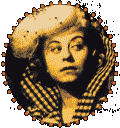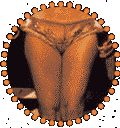   |    |    |
  
|
Variety Lights (1950) is a rarity in the career of Federico Fellini, though not an unexpected one for a first-time director. The film was a collaboration, in production, direction, and screenplay, with another auteur, Alberto Lattuada. Up to that time Fellini had worked mainly on screenplays (most notably Rossellini’s Open City), while Alberto Lattuada was already an established, respected director of neorealism and quality literary adaptations. Fellini fans and scholars have spent much time and ink on trying to determine who did what in the film — a question immediately confused by the presence of both men’s wives in the two lead female roles. Fellini himself has weighed in on the subject in his typically witty, elusive way. In Charlotte Chandler’s book I, Fellini, he says: "I have been asked many, many times about who really directed Variety Lights. Should it be counted as one of my films or as one of his? He counts it as one of his, and I count it as one of mine. We are both right." Ultimately it appears to be a typical exploration of one of Fellini’s favorite subjects, the "theatrical life" as lived by a group of second-rate itinerant entertainers. While he would explore this terrain to greater effect a few years later with La Strada (reducing the troupe to two), Variety Lights has its own charms.
Fellini’s infatuation with deluded dreamers and the eternal lure of showbiz, even in its kitschiest forms, is evident from the film’s opening moments. Low-budget impresario Checcho del Monte (Peppino De Filippo) heads a ragtag band of entertainers who take their show on the road. They encompass a wide variety of types, including Checcho as the head comedian and, per his own description, "tango virtuosi," "a famous imitator," "an international fantasy entertainer," and the always indispensable "possessed showgirl." The group, which includes Fellini’s wife Giuletta Masina as Checcho’s ever-forgiving girlfriend Melinda Amour, forges bravely on despite constant problems with intransigent creditors, pushy theatre owners, internal bickering and grandstanding, Checcho’s outsized ego and business ineptitude, and audiences as likely to ridicule the performers as applaud them. The acts themselves run the gamut from pompous pastiches of high art ("tango virtuosi") to vaudeville shtick (love songs to a goose and a parrot), to tacky "exotic" routines ("Sweet Molokai"), to bump-and-grind fare with nearly nude female dancers who of course generate the most applause. Checcho manages to keep everybody together, at least for awhile, despite the many problems and despite his own wandering eye.
Into this happy group comes Liliana (codirector Lattauda’s wife Carla Del Poggio), a hinterlands beauty queen who pines for the stage, even the threadbare one that Checcho eagerly offers her. In one of the film’s funniest scenes, she enchants an otherwise bored audience — and alienates the other performers — when her skirt is accidentally torn off. Egged on by the theatre owner despite the rest of the company’s irritation, she plays up the cheescake and becomes not only the star of the show but the target of Checco’s perpetual lust. From here the story becomes a mix of amusing and dour vignettes stitched together by Checcho’s increasing pursuit of and humiliation by Liliana, whose true colors soon shine through her veneer of sweetness and innocence.
One of Variety Lights’ pleasures is its empathy with the performing life in all its shoddy glory. The camera lingers lovingly both on the performers, who heroically continue their routines even when the audience is sleeping or screaming at them to stop, and on the audience itself, the wonderful everyman/everywoman faces that are glimpsed briefly but vividly throughout the film. This is clearly an insider’s view (another hint that the film belongs more to Fellini, who knew this territory well), sweetly recording a dazzling level of detail of the life. Among the film’s many memorable images and motifs are the old man who hides with his goose in the toilet of the train to avoid paying for a ticket; the performers crossing themselves before they go onstage; the audience’s sudden, quite unexpected inspiration to sing along with the tired lyrics to a clichéd romantic tune: "Oh mummy, I’m so much in love!"; and Masina’s enchanting stroll through history as she impersonates Napoleon and Garibaldi.
The film also doesn’t stint on the darker dimension, as evidenced by the company’s several long, arduous treks. When they can’t pay for a cab or even a haycart to take them several miles to their venue, they walk. In a memorable sequence, a rich lawyer agrees to house them all for the night on the tacit agreement that Liliana will sleep with him. When the jealous Checcho gets wind of this, he attacks the lawyer and the group is thrown out, forced again into a long walk back to town, this time at night. These walks take on an almost mythic resonance, a kind of pilgrimage as the group perseveres against any odds for the sheer pleasure of performing.
Variety Lights is an ensemble work that focuses less on individual actors than on the group, the experience of being part of an ambitious artistic entity. Nonetheless, Peppino De Filippo stands out with his marvelous portrait of the blustery, charmingly deluded impresario who bounces back no matter how low he sinks. The other actors all acquit themselves well, though we could wish for more screen time for Giuletta Masina, who would triumph in larger roles for her husband later.
Critic Andrew Sarris has pointed out the film’s similarity to All About Eve in its story of an ambitious younger performer who cunningly displaces an older player — a motif also worth examining in terms of Fellini’s work with Lattuada, given the fact that the latter is virtually unknown today while Fellini has become part of the language ("Felliniesque").
Comparisons to All About Eve aside — Variety Lights is much grittier and more discursive, less "theatrical" than Mankiewicz’s classic in spite of its theatrical subject — the film is a worthy introduction to the director’s many classics that would begin only a few years later with I Vitelloni (1953) and La Strada (1954). The Criterion Collection has issued the film without extras; and sticklers may be disappointed in the quality of the transfer, which, while generally crisp, has intermittent artifacts. Neither of these factors should discourage fans of vintage international cinema, or anyone who appreciates a strong narrative on an eternally intriguing subject. Fellini buffs will find the disc a must.
Variety Lights is now available on DVD from The Criterion Collection. Suggested retail price: $29.95. For additional information, we suggest you check out the Criterion Collection Web site.
|    |

